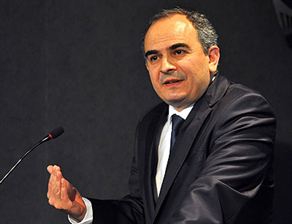Başçı: Turkey’s high inflation will start falling when high food prices stabilise
 Central Bank of Turkey (CBOT) Governor Erdem Basci said, country’s high inflation would start falling when high food prices stabilise, fuelled by drought, which affected agricultural crop negatively. Basci said, recently, elevated food prices had been the main factor limiting the pace of decline in inflation, addressing the audience in Kastamonu, north-western town of Turkey.
Central Bank of Turkey (CBOT) Governor Erdem Basci said, country’s high inflation would start falling when high food prices stabilise, fuelled by drought, which affected agricultural crop negatively. Basci said, recently, elevated food prices had been the main factor limiting the pace of decline in inflation, addressing the audience in Kastamonu, north-western town of Turkey.
“The underlying trend of inflation excluding food has been on a marked downward path in recent months, while food inflation remains elevated due to negative supply factors” he said and added:
“Recent realizations on domestic food prices diverge markedly from those on international food prices. Domestic prices rose on par with international prices in the first quarter, but continued to climb in the second quarter even if international prices were markedly down.”
He said, drought had had negative effects on domestic food prices and an active foreign trade policy to be imposed on certain agricultural products could be effective in curbing the upside risks on food prices.
Turkey’s risk premium indicators had displayed a notable improvement in the second quarter due to the tight monetary stance coupled with improvement in the domestic and external uncertainties, Basci said and continued:
“Owing to the strong and front-loaded nature of monetary tightening on 28 January, the resulting decrease in risk premiums, the improving global liquidity conditions, the slowing trend of inflation and the waning cumulative effects of exchange rates on inflation; the CBRT has decided to deliver measured rate cuts recently.”
Due to decreased domestic and external uncertainty, announcements of extended accommodative monetary policy from central banks in advanced economies and the tight monetary stance, the Turkish lira volatility appeared to have recently fallen more, as compared to similar countries, according to Governor Basci.
“The growth of commercial loans maintain a robust course, while that of consumer loans recede to more reasonable levels, which support macro financial stability, rebalancing process and disinflation” he added.
National income maintained its moderate course and net exports contribute positively to growth, he said, adding that non-gold exports remained on the rise, while non-gold imports continue to fall.
“Accordingly, a significant improvement in the current account balance in 2014 is expected” he said and added:
“Oil prices remained a little above the April forecast in the second quarter, whereas import prices lagged below projections. Given the current outlook, the developments in oil and import prices by and large balances each other off for inflation outlook.”
According to Basci, medium-term forecasts were based on the assumption that the tight
monetary policy stance would be maintained by keeping a flat yield curve and the improvement in global liquidity conditions would be sustained.
“It is assumed that the annual loan growth rate will stabilize around 15 percent towards the end of 2014 on the back of the macro prudential measures taken” he said.
SOURCE: MEDIA





